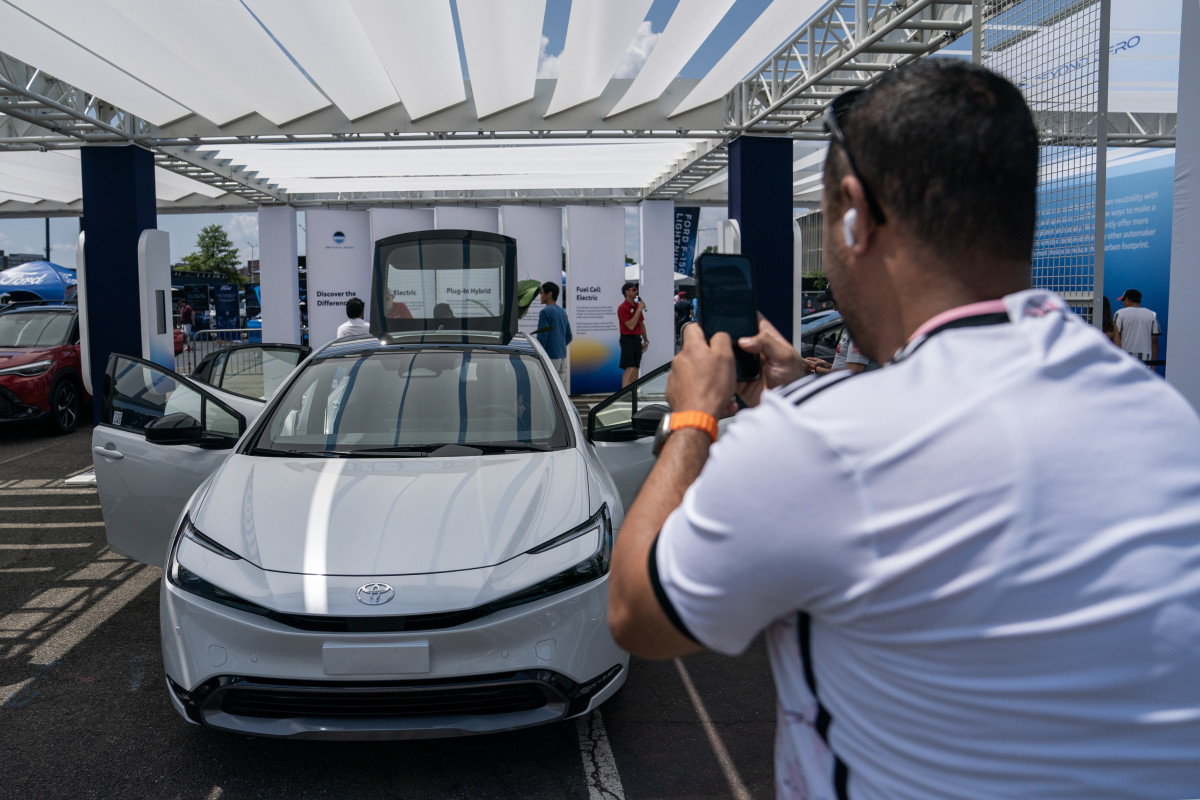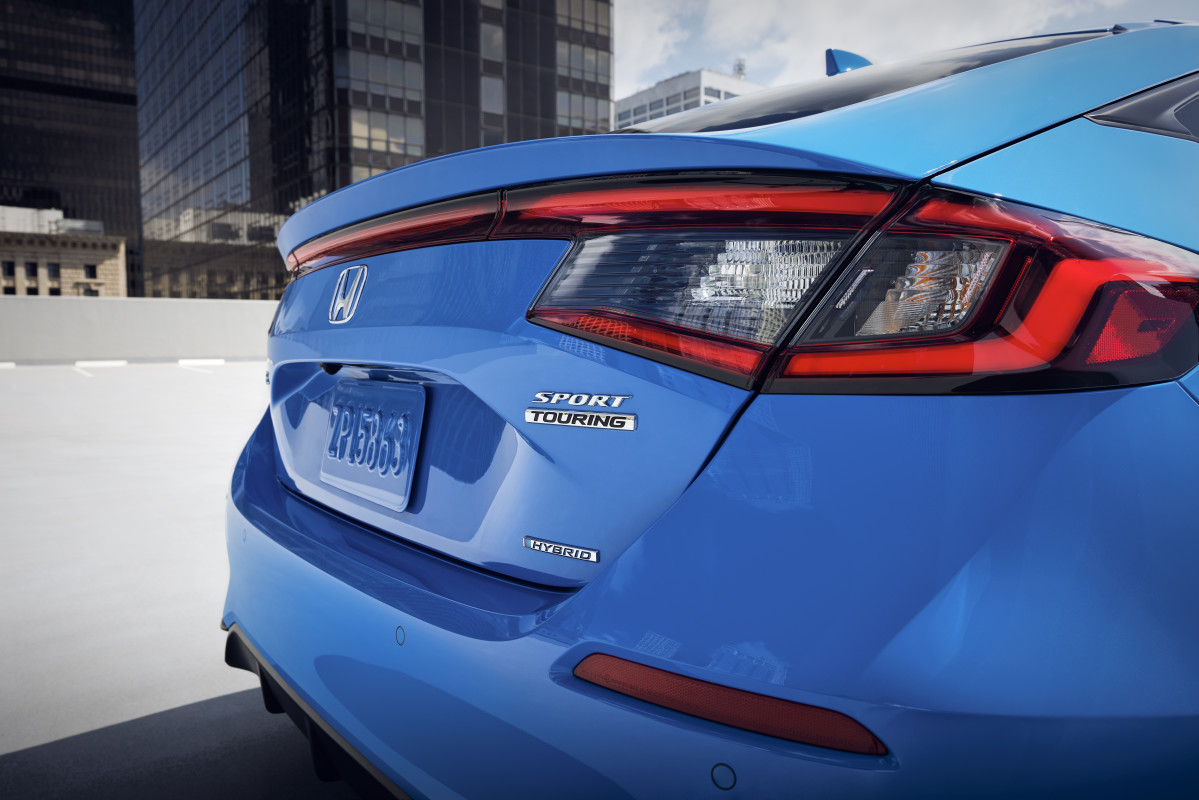
A lot of hype surrounds electric vehicles, including Rivian (RIVN) and Tesla (TSLA) models.
The promise of virtually zero airborne emissions and gas-free propulsion is tempting for many buyers who consider their purchase a conscious choice to reduce their carbon footprint and change how they get around.
🚨Don’t miss this amazing Cyber Week Move! Get 60% off TheStreet Pro. Act now before it’s gone.😲
While EVs offer benefits, switching from the pump to the plug can be a tall order for many motorists. EVs have a limited range, and charging complications can be real hurdles for owners to overcome.
Nevertheless, newly released sales figures show that a segment of EV alternatives is gaining more traction among U.S. buyers, allowing manufacturers to pocket record-setting gains.

All hail the gas-electric hybrid
According to the latest monthly sales data from several mainstream manufacturers, demand for gas-electric hybrids in the United States in November shows they've become one of the fastest-growing segments for new car sales.
According to data seen by Automotive News, one manufacturer posting big gains is Japanese automaker Toyota (TM) .
While other mainstream stalwarts have heavily bet on electric vehicles, Toyota persists in believing that buyers prefer hybrids. Recently, it expanded its hybrid technology beyond the iconic Prius to include being the sole engine choice in mainstream models like the Camry.
That move appears to be paying off.
Last month, Toyota Motor North America broke a two-month-long U.S. sales slump by posting a 4.8% sales jump powered by strong sales of hybrids.
Sales of two models solely offered as hybrids, the iconic Camry and the cult Tacoma pickup, rose by double-digits in November, posting gains of 25% and 29%, respectively.
In November 2024, Toyota’s electrified vehicle sales, which include EVs, plug-in hybrids, and gas-electric hybrids, increased by 49% to about 100,000 units.

Honda
Honda, Hyundai also see surging hybrid car sales
Toyota's rival and Japanese compatriot, Honda (HMC) , credits strong "light trucks and electrified models" sales for its strong U.S. unit sales in November. Vehicle sales grew 14.5% to 121,419 cars last month.
In its data, Honda lumps together both EVs and battery-electric hybrids as "electrified" vehicles but says that sales during November 2024 set a new monthly record for electrified vehicles, as a "strong demand for hybrids" with 38,374 of them sold.
With the 6,823 units of the Prologue pure EV taken out, the 31,551 hybrid models of the Civic, Accord, and CR-V crossover SUV that left Honda dealerships is a significant chunk of its November 2024 sales. Sales of hybrids alone represented roughly 28.7% of the 110,020 cars that the Honda brand alone pushed out.
More Automotive:
- Toyota sales slide in Japan and China—what’s behind the decline?
- Jaguar’s controversial rebrand may have a silver lining after all
- S&P analysts issue stern warning about tariff effect on car buyers
However, the biggest, most surprising hybrid growth comes from South Korean automaker Hyundai (HYMTF) .
According to data released by the automaker on December 3, sales of hybrids at Hyundai dealers are up 104%, with the biggest gains coming from hybrid versions of its mainstream models, such as the Santa Fe and Tucson crossover SUVs. Sales of the two models jumped 64% and 227%, respectively.
In a statement, Hyundai Motor America CEO Randy Parker credited EV and hybrid vehicles' strong performance and availability as the driver behind an "exceptional sales month."
The growth isn't just limited to foreign manufacturers.
Related: Toyota exec slams "impossible" EV mandate amidst political chaos
Dearborn's Ford (F) may be hyping its "Skunk Works" EV project, but its latest sales data shows that hybrid vehicle sales across Ford and Lincoln brands were up 18.5% in November 2024, representing a 42% year-to-date gain.
Toyota CEO makes prediction on EVs future market share
Though the automotive world is adapting to even tighter emissions regulations in the U.S., the EU, and other territories worldwide, many auto figureheads and executives believe buyers need choice.
In a company event in January 2024, Toyota Chairman Akio Toyoda declared that carbon itself is the true enemy and that any way to remove it, including deploying gas-powered hybrid vehicles that produce lower emissions than full-on gas-guzzlers, makes a world of difference.
He claimed that Japan has reduced CO2 emissions by 23% since introducing hybrid cars in its domestic market.
Additionally, he made a very blunt prediction about the future of electric vehicles.
"No matter how much progress [Battery Electric Vehicles] BEVs make, I think they will still only have a 30% market share," said Toyoda. "[...] I think this is something that customers and the market will decide, not regulatory values or political power."
In a similar vein, Toyota Motor North America (TMNA) chief operating officer Jack Hollis declared that rules regarding EV adoption in CARB states that are due to take effect in 2025 are “impossible” for automakers like Toyota to meet, noting that customers will naturally gravitate toward cars they want to buy.
He stressed that such rules would lead to automakers committing "unnatural acts," where automakers disproportionately provide more "compliance" cars like EVs, plug-ins, and fuel-cell vehicles to CARB-adopting states and limiting buyers' choices at dealerships there.
“It’s going to distort the industry. It’s going to distort the business. Why? Because it’s unnatural to what the current demand in the marketplace is,” Hollis said.
Related: Veteran fund manager sees world of pain coming for stocks







